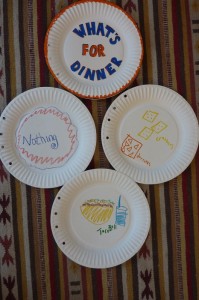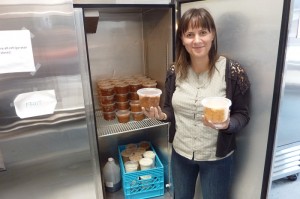Reed, Lewis & Clark Colleges Show that a Little Food Goes a Long Way
Bon Appétit is known for being thrifty in the kitchen: we cook our own stocks from scratch, we utilize just-in-time-batch cooking techniques, and we buy fresh from local farmers. So when our chefs at Reed and Lewis & Clark Colleges first sat down with Ava Mikolavich from Urban Gleaners to discuss a food recovery program, they were skeptical of how much food they could actually donate.
Still, as Dani Turk from the hunger relief organization Food Life Line once said, “Though it may seem like nothing, one piece of lasagna is still a dinner for a person in need.” So in April, the two schools began donating leftover food that would otherwise go to waste to Urban Gleaners. The two cafés have donated a total of more than 5,000 pounds of food since the start of the program!

Drawings of what Cherry Park Elementary School students had for dinner: Doritos, crackers, Taco Bell, and “nothing”.
Once the food has left our cafés, it’s taken back to Urban Gleaners’ small warehouse in northwest Portland, OR, where they inspect the food to make sure it’s fit for consumption. They then break the food into smaller portions, which are taken to one of 12 Title 1 schools in the area. The majority of the students at these schools are on free or reduced lunch programs and are from low-income families. At the school, the food gets laid out on a table by category (produce, dairy, prepared meals, etc.) and families come by when they pick up their children to “shop” for items to take home and eat. This helps ensure that the children get fed outside of school and that other family members don’t go hungry.
Urban Gleaners worked with Principal Kate Barker at Cherry Park Elementary School (one of the schools they donate to) to have her students draw on a paper plate what they had for dinner the night before. Many of the drawings depicted junk food and snacks; a few of the plates, heart-breakingly, had nothing.
Food recovery is an important solution to ending hunger in Oregon, and Bon Appétit is proud to be working with Urban Gleaners to get high-quality, nutritionally dense food to the people who need it most in our community.
